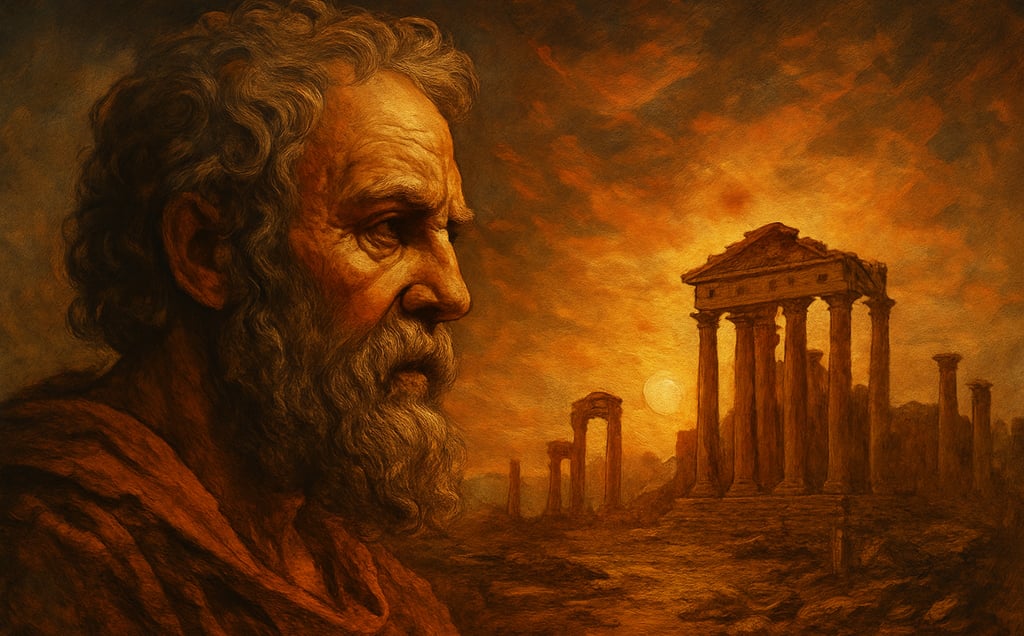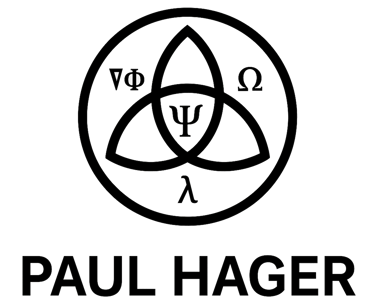Heraclitus Lives Next Door
Heraclitus of Ephesus, the ancient philosopher of tension and becoming, still speaks through the field. This reflective essay explores how his thought lives on — not in books, but in presence, orientation and a new field-driven economy.
POPULAR
Paul Hager
7/24/20253 min read


On tension, direction and the clarity of darkness
When I look out my window, I face the direction of Ephesus. Just a few hours’ drive from here — along the Aegean coast, between olive trees and scattered marble — once lived a man who described the world not as matter, but as a field. His name was Heraclitus of Ephesus. Philosopher, mystic, perhaps a disillusioned aristocrat. Born around 540 BCE, he wrote a single treatise, now lost, of which only fragments remain. Yet his thought echoes through centuries.
Heraclitus didn’t see the world as a collection of things. He saw it as a field of tension — always in motion, never fixed, constantly becoming. He didn't explain, he invoked. And he did so in brief, cryptic sentences that resist paraphrasing. Sentences that don’t want to be understood — only entered.
I don't spend my time reading ancient texts. I work with field structure, with the physics of direction, with the dynamics of how form emerges through tension. But I keep encountering him — not in books, but in the field itself. As if he’s not a historical figure but a persistent presence, still murmuring through the gaps of modern thought.
The darkness that clarifies
They called him the obscure one. Not because he hid meaning, but because he required you to meet it. Heraclitus wrote like a threshold: his language doesn’t explain, it shifts the reader. He once said:
“The oracle at Delphi neither speaks nor conceals — it gives a sign.”
(Fragment DK22B93)
This wasn’t about riddles. It was about how the field speaks: not in explanations, but in resonance. The words themselves were vessels. To read Heraclitus is to be reoriented.
I’ve often received the same reaction to my own writing — “too cryptic,” “too indirect.” But clarity doesn’t lie in the sentence. It lives in the reader’s field. What appears obscure to the mind may be sharply clear to the body. Heraclitus knew that. He didn’t write for understanding. He wrote for awakening.
Tension as origin
Heraclitus claimed that polemos — tension, conflict — is the father of all things. Not love. Not order. Not design. But differentiated pressure.
This isn't a metaphor. It’s field physics. In my work I describe it as ∇Φ — the tension differential that precedes structure. Where there is no difference, there is no direction. Where there is no direction, there is no incarnation.
Later philosophers softened his stance. Plato sought timeless ideals. Aristotle turned to substance. But Heraclitus stayed with the real: everything flows. Everything arises from tension. Not out of chaos, but out of unresolvable difference.
He didn’t observe that — he embodied it.
Identity as orientation
One of his fragments reads: “Character is destiny” (ēthos anthrōpō daimōn). This isn’t morality. It’s pure orientation. He meant that who we are is not an inventory of traits, but a vector. We don’t possess identity — we become it, if the field allows.
That’s what I call Ψ: the directional vector of the incarnate field. Identity is not fixed essence. It is a continual emergence of pattern, in response to context. Heraclitus saw it. He didn’t argue for it — he lived it.
You never step into the same river twice, he said. But more deeply: you are not the same river either.
Logos as field order
Heraclitus introduced the word logos — long before logic claimed it. For him, it wasn’t reasoning. It was the underlying pattern of coherence. Not imposed from outside, but unfolding within.
“This logos is eternal, yet men fail to understand it… even though all things happen according to it.”
(Fragment DK22B1)
The logos wasn’t an idea. It was an order — a field that speaks through resonance, not explanation. He saw how people lived outside it. How they tried to substitute control for coherence. How they ignored the deeper rhythm that gives form its meaning.
That same forgetting persists now. But so does the field.
From Logos to Logosisme
In my own work, this logos has found a new articulation — not only as ontology, but as economy. I call it Logosisme: a values-driven economic model in which Logos (meaning), Telos (personal orientation) and Agapè (mutual care) are the core drivers of value. Not idealistically, but structurally — grounded in feedback systems, decentralized architecture and long-range coherence.
It’s not a utopia. It’s a reentry into the field. A form of economy that doesn’t manage scarcity, but cultivates resonance. Where value emerges not from extraction, but from direction, presence and care.
Heraclitus might not have called it that. But I believe he would have recognized the field it seeks to serve.
Heraclitus, still speaking
I don’t see Heraclitus as a relic. He’s not a voice from the past. He’s a vector still active in the field — still shaping how we sense time, difference, presence.
He doesn’t ask to be admired. He asks to be heard.
And when the world becomes noise, his words remain quiet and exact. Not to explain — but to orient.
That’s why I say: Heraclitus lives next door.
